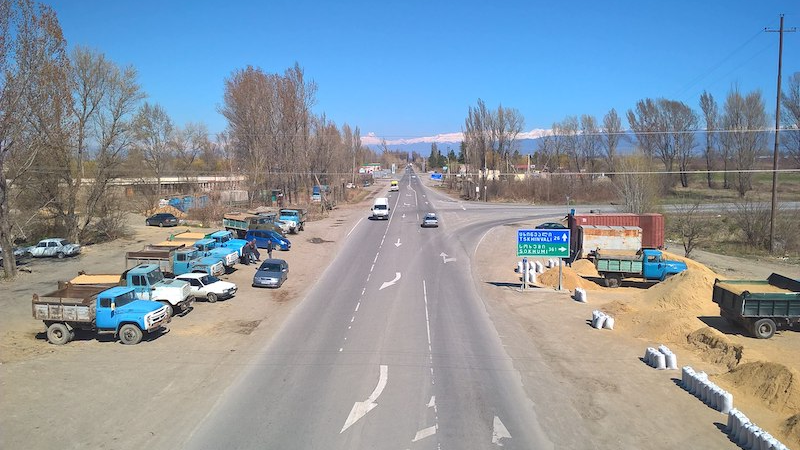
“Divide et impera”: How can Tbilisi preclude the Kremlin from turning ethnic minorities against the Georgian state?
By Salome Chokheli, GMAP 2021 alumna of The Fletcher School
The tale of Russia sowing discord in Georgian society is one as old as time. Despite the collapse of the Soviet Union, the Kremlin was never able to abandon its urge to restore hegemony over post-Soviet countries. Russian President Vladimir Putin even called the dissolution of the USSR the “biggest geopolitical catastrophe of the century.”
In the early ’90s, when Georgian statehood was nascent, Georgia’s multi-ethnic community became the source of several Russian-supported separatist conflicts. Societal fragmentation, combined with rising nationalism throughout Georgia, contributed to the Georgian state’s underbalancing behavior in the face of Russian-backed conflicts in the occupied Abkhazia and Tskhinvali regions. During this period, the Kremlin exploited ethnic minority groups who lacked identification with the Georgian state with alacrity. The disputes resulted in a relative status quo that lasted until the August War.
A confluence of different factors contributed to Russia’s military invasion of Georgia in 2008. However, a significant event that contributed to the Russian military invasion took place at the NATO Bucharest summit, where Georgia and Ukraine were promised they would become members of the organization one day. Vladimir Putin, who has repeatedly blamed NATO for breaking a nonexistent promise of not expanding to the east, saw this pledge as a direct threat to Russia’s security. The Kremlin sees Georgia and Ukraine as Post-Soviet states that fall under Moscow’s “privileged“sphere of influence. The Kremlin portrays NATO’s prospective military presence in these countries as an attempt of the West to encircle Russia.
Moscow was never ready to give up claims on post-Soviet countries, especially after the Baltic states became members of NATO despite the Kremlin’s objection. In August 2008, Russia invaded Georgia, occupied the Georgian regions of Abkhazia and Tskhinvali, and established effective control over the two regions on the ground. This was an archetypal act of Moscow demonstrating its power by completely neglecting the fundamental principle of sovereignty and territorial integrity, the cornerstone of rules-based international order. In January 2021 European Court of Human Rights ruled that Russia committed a series of human rights violations in Georgia during August War.
After President Mikheil Saakashvili rose to power, Tbilisi chose a Western-aligned foreign policy as a balancing strategy against Russia. Ethnic minority groups, as part of Georgia’s society, represent a significant “filter” through which systemic imperatives are transmitted. Perceptions of ethnic minority groups impact Foreign Policy Executive’s ability to implement the abovementioned foreign policy. The National Democratic Institute in Georgia published results of the most recent 2022 polls, which indicate that “EU and NATO support remains the lowest in the minority settlements, on the expense of high ‘don’t knows.” Notably, the wider Georgian public remains adamant about its support for NATO and the EU. The 2014 General Population Census breaks down the list of the largest ethnic minorities in Georgia: Azerbaijanis 233,000 (6.3%) and Armenians 168,100 (4.5%). Other ethnic groups include Russians 26,500 (0.7%), Ossetians 14,400 (0.4%), Yezidis 12,200 (0.3%), Greeks 5,500 (0.1 %), Kists 5,700 (0.2 %), Assyrians 2,400 (0.1 %), Ukrainians 6,000 (0.2%) as well as small Jewish and Polish communities. Armenians and Azerbaijanis are settled in the regions of Samtkshe-Javakheti and Kvemo Kartli; notably, they represent the majority on the ground, making them enclaves.
Ethnic minorities who lack identification with the Georgian state will be easier to manipulate by an external force such as Russia. Georgia has a history of the Kremlin exploiting minority groups to ignite conflicts. Thus the state will not be able to mobilize society against external threats in the realm of societal fragmentation. Without ethnic minorities’ increased identification with the Georgian state, social cohesion is almost unachievable, and thus extractive and mobilizing power cannot be maximized. Suppose ethnic minorities continue to be disintegrated from the state with the current degree of affinity toward Russia. In that case, they might not allow the Georgian state to implement foreign policy choices to balance against threats stemming from Moscow.
To counter this, Georgia should increase the political representation of ethnic minority groups in the central governmentvia increased quotas for government jobs. Inclusion in the decision-making process can incentivize minority groups not to align with Russia in case of a new escalation. Decision-makers representing ethnic minority groups can potentially serve as “influence agents” in their local settlements. Curricular activities aimed at teaching the Georgian language to ethnic minorities will significantly inhibit the influence of Russian TV channels and anti-Western propaganda in compact settlements.
People-to-people contact may serve as a further unifying factor on a psychological level. Curricular reform is needed for a diminished language barrier, which may incentivize increased communication between settlement representatives and the wider Georgian public. Ethnic minorities’ lack of identification with the state and heightened susceptibility to Russian disinformation could have a pernicious influence on Georgia’s security environment. The Georgian government should not be oblivious to the issue of ethnic minorities as it risks being tractable to the Russian inclination to use separatism against the state.
